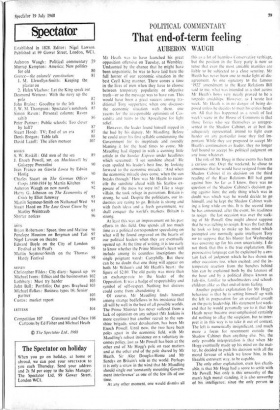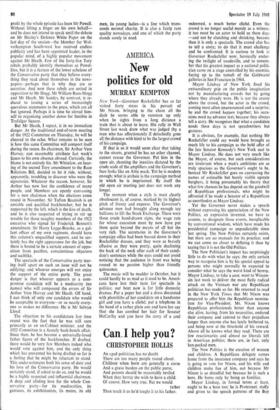That end-of-term feeling
POLITICAL COMMENTARY AUBERON WAUGII
Mr Heath was to have launched his great opposition offensive on Tuesday, at Wembley.
Undaunted by the chance that he might have been unpatriotic, he was to have laid bare the full horror of our economic situation in the best Cecil King manner. There comes a time in the lives of men when they have to choose between temporary popularity or objective truth—or so the message was to have run. This between temporary popularity or objective truth—or so the message was to have run. This would have been a great success among tra- ditional Tory supporters; when one discusses the economic situation with them. one yearns for the irresponsible optimism of Cas- sandra and turns to the Apocalypse for light relief.
However, the leader found himself nipped in the bud by his deputy, Mr Maudling. Before he could utter his first syllable condemning the Government for its ineptitude and roundly blaming it for the hard times to come. Mr Maudling had slipped in with a cunning little article in the Sunday Express under headlines which screamed : 'I see sunshine ahead.' He even spoiled his leader's best line, by looking forward to the economic miracle: 'And when the economic miracle does come, when the sun breaks through.' How was Mr Heath to recon- cile the sunshine ahead with his fearless ek- posure of the mess we were in? Like a stage villain, the took refuge in patriotism. Britain is strong, he said. Despite the politicians, our in- dustries are raring to go. Britain is strong and with fresh ideas and a fresh government, we shall conquer the world's markets. Britain is strong.
At least this was an improvement on his past efforts in this field. One spends all too much time as a political correspondent speculating on what will be found engraved on the hearts of our political leaders when they are eventually opened up. At the time of writing, it is too early to know whether the Prime Minister's heart will include among its countless inscriptions the single poignant word: Caerphilly. But there can be no doubt that one thing will appear on both Mr Wilson's and Mr Heath's heart: the figure of $2.80. The old parity was more than an exchange-rate to the leader of the Opposition. It was a badge of respectability and symbol of self-respect. Nothing but distress could come from abandoning it.
Of course, Mr Maudling finds himself among strange bedfellows in his insistence that all will be well in the best of all possible worlds. The Prime Minister has never suffered from a lack of optimism on any subject (Mr Jenkins is more cautious) but another recruit to the sun- shine brigade, since devaluation, has been Mr Enoch Powell. Until now, the two have been poles apart in the economic field, with Mr Maudling's robust insistence on a voluntary in- comes policy, just as Mr Powell has been at the other end of Mr Hogg's pole on race matters and at the other end of the pole shared by Mr Heath, Sir Alec Douglas-Home and Mr Sandys on Britain's role in the world. Perhaps it is only a straw in the wind that Mr Maudling should single out 'constantly mounting Govern- ment interference' as one of the few ills of our time.
At any other moment, one would dismiss all this as a lot of harmless Conservative verbiage, but the position in the Tury party is now so
tense that even the most amiable inanities are liable to be subjected to a close scrutiny. Mr Heath has never been one to make light of dis- agreement. As one signatory to the famous '1922' amendment to the Race Relations Bill said to me. what was intended as a shot across Mr Heath's bows very nearly proved to be a torpedo amidships. Ho%%tner, as I wrote last week. Mr Ileath is in no danger of being de- posed unless he decides to meet his critics head- on. All that has happened as a result of last week's scene in the House of Commons is that those Tories who see themselves as unrepre- sented in the Shadow Cabinet, or at best in- adequately represented. intend to fight even harder on any particular issue they feel im- portant. While they arc prepared to accept Mr Heath's continuation as leader, they no longer feel bound to accept his political judgment on any issue whatever.
The role of Mr Hogg in these events has been a curious one. Over the weekend, he chose to announce that he would have resigned from the Shadow Cabinet if its decision on the third reading of the Race Relations Bill had gone against him. So far as I know, there was no question of the Shadow Cabinet's decision go- ing against him; the only thing which was in doubt was which way he would decide to go himself, and he kept the Shadow Cabinet wait- ing a long while on this. It is the second time he has announced, after the event, his readiness to resign - the last occasion was over the sack- ing of Mr Powell. One might almost suppose that he was itching to resign. It was the fact that he took so long to make up his mind which prompted one normally quite intelligent Tory NIP to suppose that his bluster last Wednesday was covering up for his own uncertainty. I do not think that this is the true explanation. His provocative language can be explained by a cer- tain lack of judgment which he has shown on other occasions too, when excited; and the in- temperate reaction from the benches behind him can be explained both by the lateness of the hour and by a political illness known as July-itis. familiar to schoolmasters and school- children alike as that end-of-term feeling.
Another popular explanation for Mr Hogg's behaviour is that he is setting himself up with the left in preparation for an eventual assault on the party leadership. His statement last week- end that he would personally see to it that Mr Heath never became over-emphasised certainly did nothing to allay the suspicion, but to inter- pret it in this way is to take it out of context. The left is numerically insignificant, and much more a focus for resentment outside the Shadow Cabinet than anything else. No, the only possible interpretation is that when Mr Hogg eventually made up his mind on the mat- ter, he decided to push his decision with all the moral fervour of which we know him, in his likeable extrovert way, to be capable.
The only other explanation, even less charit- able, is that Mr Hogg had a score to settle with Mr Powell. Not only is this-unworthy of the man's high moral standing, it is also unworthy of his intelligence; since the only person to
profit by the whole episode has been Mr Powell. Without lifting a finger on his own behalf— and he does not intend to speak until the debate on Mr Healey's Defence White Paper on the last day of the session—the Member for Wol- verhampton South-west has received endless publicity and has been appointed leader, in the popular mind, of a highly popular movement against Mr Heath. Few of the forty-five Tory rebels probably identify themselves as Powel- lites, but it is a feature of the lower echelons of the Conservative party that they believe every- thing they read about themselves in the news- papers—perhaps that is why they are so secretive. And now these rebels are united in opposition to Mr Hogg, Mr William Rees-Mogg and Mr Heath. Mr Sandys, by contrast, is re- duced to issuing a series of increasingly querulous statements to the press, which are all but ignored. Perhaps it is time he stirred him- self to organising another demo for Smithie in Trafalgar Square.
But Mr Heath, I repeat, is in no immediate danger. At the traditional end-of-term meeting of the 1922 Committee on Thursday, he will be cheered to the echo. What remains to be seen is how this same Committee will comport itself during the recess. Its chairman, Sir Arthur Vere Harvey, can reasonably attribute last week's fiasco to his own absence abroad. Certainly, the blame is not entirely his. Mr Whitelaw, on hear- ing of the second Tory amendment to the Race Relations Bill, decided to let it ride, without, apparently, troubling to discover who were the signatories. Whatever the reason, however, Sir Arthur has now lost the confidence of many people, and Members are openly canvassing for a new chairman when the elections come round in November. Sir Tufton Beamish is an amiable and qualified backbencher, but he is supported by the left, which is the kiss of death, and he is also suspected of trying to stir up trouble for those naughty members of the 1922 executive who signed Sir Frederick Bennett's amendment. Sir Harry Legge-Bourke, as a gal- lant officer of my own regiment, should have this column's unqualified support, and he cer- tainly has the right appearance for the job, but there is bound to be a certain amount of oppo- sition from pacifists, conscientious objectors and suchlike.
The spectacle of the Conservative party tear- ing itself apart on such an issue will not be edifying; and whoever emerges will not enjoy the support of the entire party. The great danger is that whoever appears as a com- promise candidate will be a mediocrity (no names) who will compound the errors of Sir Arthur Vere Harvey and Mr Heath. Off hand, I can think of only one candidate who would be acceptable to everyone—or so nearly every- one as makes no difference. He is Mr Selwyn Lloyd.
The objection to his candidature last time round was the fact that he was still seen primarily as an ex-Cabinet minister, and the 1922 Committee is a fiercely back-bench affair. Since then, he has become a universally-loved father figure of the backbenches. If drafted, there would be very few Members indeed who would vote against him, and the only thing which has prevented his being drafted so far is a feeling that he might be reluctant to stand. This under-estimates both his sense of duty and his love of the Conservative party. He would certainly stand, if asked to do so, and he would be a highly respected and influential chairman. A deep and abiding love for the whole Con- servative party—for its mediocrities, its geniuses, its exhibitionists, its mutes, its old
men, its young ladies—is a line which trans- cends normal charity. It is also a fairly rare quality nowadays, and one of which the party stands sorely in need.







































 Previous page
Previous page